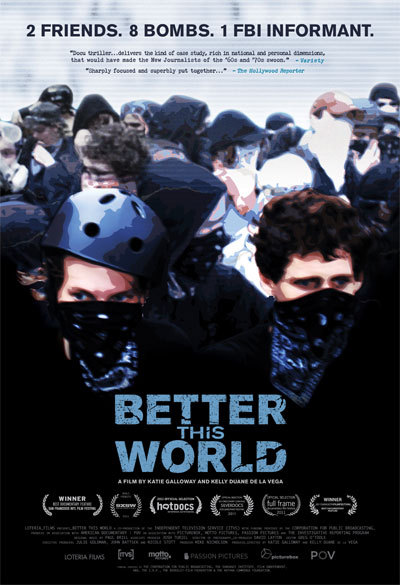I’m going to go ahead and call SPOILER ALERT at the top of this column (even though it’s about widely reported events). That’s because 1) I don’t want to wreck anyone’s experience watching a genuinely gripping documentary, and 2) since those events don’t involve sex, celebrities or celebrity sex, I’m assuming they’ve been largely forgotten.
Like the best “political” documentaries, “Better This World” (showing tonight at Space Gallery) focuses on a single event which, as its story unfolds, becomes more and more layered. Regardless of your political predilections, this movie, about a pair of clean-cut American boys arrested for “domestic terrorism” at the 2008 Republican national convention, will swing your sympathy pendulum enough to make you dizzy.
Hunter S. Thompson memorably said, “The weakest link in any civil rights case is always the defendant,” but on many levels, defendants Brad Crowder and David McKay are the most palatable “terrorists” American audiences could want: articulate and polite in interviews, Texas-born, idealistic (and, you know, white).
Finding themselves kindred, rebellious spirits in opposing the (second) Gulf War and the (second) Bush administration, the two rapidly became politicized — especially upon meeting Brandon Darby, an older, more experienced and more militant organizer who fueled their nascent activism and youthful machismo, and preached direct action rather than just talk and peaceful protest.
As the film convincingly portrays, it was under Darby’s guidance that Crowder and McKay decided to travel to Minnesota (a trailer full of homemade riot shields in tow) to join protests designed to disrupt the GOP convention. Once there, and seeing the extent of the police harassment of their fellow protesters, the pair seemed to be inspired to take their activism to a darker level before they were arrested.
But, as “Better This World” directors Kelly Duane and Katie Galloway reveal (in a plot twist worthy of a Hollywood thriller), Darby was an FBI informant. And the resulting court cases bring to light some troubling questions about the role of government infiltration of protest groups.
Here’s where the pendulum swings (even for a lefty like me):
On one hand, there’s compelling evidence that Darby’s role in motivating his new pals was as close to entrapment as you can get, and that his actions may have inspired them to do things they otherwise would not.
On the other, what Crowder and McKay did was make eight Molotov cocktails which, they claim, they intended to use (on inanimate, symbolic targets, but still).
On one hand, the FBI was acting on seemingly credible information that a real threat was imminent. On the other, their methods, both in using an undeniably questionable informant and in being seemingly determined to cut deals intended to keep the defendants from having their day (and say) in court, smack of the worst in post-9/11 civil rights violations.
On the one hand, I don’t want to get blown up. But on the other, not everyone is willing to give up their constitutional rights in exchange for the promise of safety. And so on …
“Better This World” benefits as well from some deft filmmaking. Its quick pace, skillful editing and riveting story make for one of the most thought-provoking films I’ve seen this year.
Dennis Perkins is a Portland-based freelance writer.
Copy the Story Link
Send questions/comments to the editors.



Success. Please wait for the page to reload. If the page does not reload within 5 seconds, please refresh the page.
Enter your email and password to access comments.
Hi, to comment on stories you must . This profile is in addition to your subscription and website login.
Already have a commenting profile? .
Invalid username/password.
Please check your email to confirm and complete your registration.
Only subscribers are eligible to post comments. Please subscribe or login first for digital access. Here’s why.
Use the form below to reset your password. When you've submitted your account email, we will send an email with a reset code.